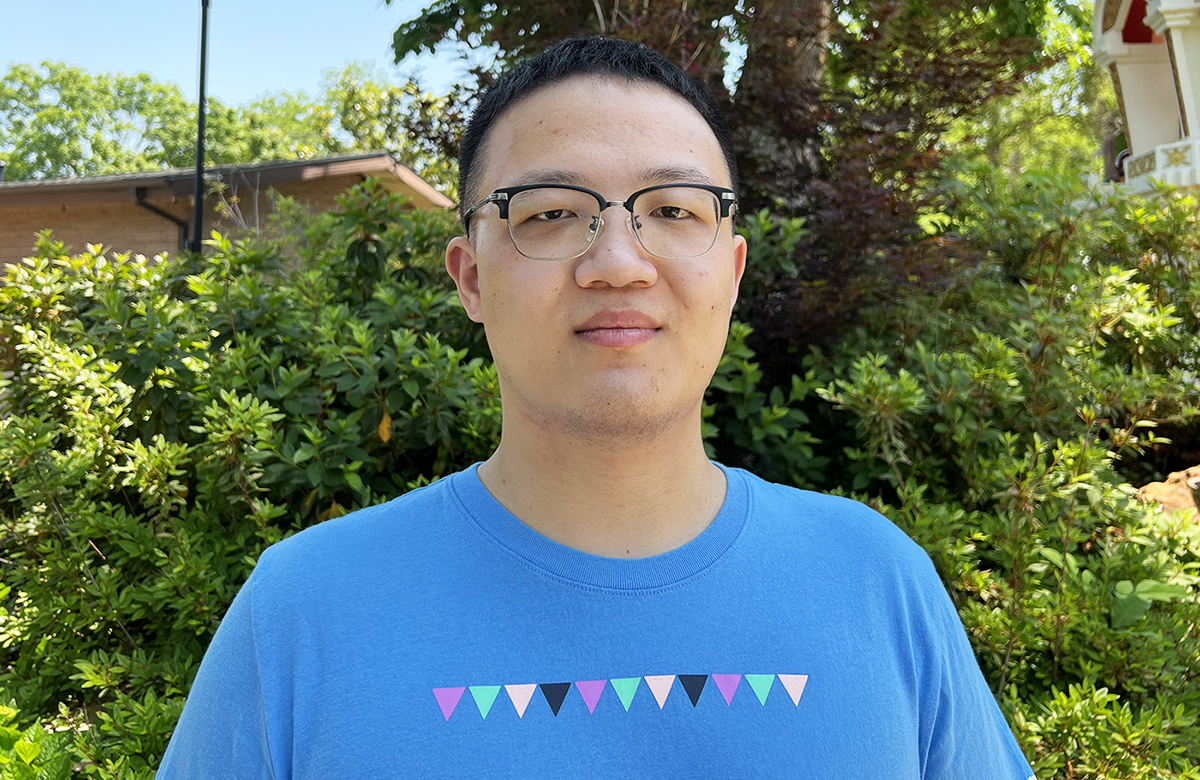Physics doctoral student earns prestigious computational science fellowship

A doctoral student in physics at The University of Texas at Arlington has been awarded a prestigious fellowship to utilize the most powerful academic supercomputer in the world for his research.
Shiwei Zhou, whose research is in medical physics, was named one of five 2022-23 Frontera Computational Science Fellows selected during a nationwide application process. The cohort will spend the next year collaborating with experts at the Texas Advanced Computing Center (TACC), including a $34,000 stipend with an additional $12,000 in tuition allowance, a paid summer residence at TACC on the UT Austin campus, and 50,000 node-hours on Frontera.
Frontera is a petascale computing system built in 2019 with funding from the National Science Foundation. It is one of the most powerful supercomputers in the world and the fastest on a university campus. Through its computational abilities, it creates new possibilities in science and engineering research by allowing scientists to take on much larger and more complex research challenges.
“I was shocked to find that I received the fellowship,” Zhou said. “This fellowship had lots of applicants nationwide, all of them competitive senior Ph.D. students. I knew some UTA Ph.D. students applied before but were not awarded. This is the first time that a UTA student has received this fellowship.”
Mingwu Jin, UTA associate professor of physics and Zhou’s faculty advisor, said that Zhou is highly deserving of the fellowship.
“Mr. Zhou is one of brightest students that I have ever advised,” Jin said. “He had given up a well-paid high-tech job to pursue a Ph.D. degree with me and made significant contributions to the medical imaging field, as shown by two journal papers as lead author and several oral presentations selected by top national/international conferences. The Frontera fellowship is a huge recognition of his research achievement, capability, and significance. He is well-deserving and will use the Frontera computational resources to put a last and important piece of his dissertation into place.”
Zhou’s research focus is in computed tomography (CT) and single-photon emission computed tomography (SPECT) image reconstruction and enhancement. CT scans combine a series of X-ray images taken from different angles to create detailed, cross-sectional images and can be used to visualize anatomic structures of the body. SPECT scans show how blood flows to tissues and organs and allows doctors to analyze functions of patients’ internal organs, particularly the heart and brain.
Scientists are constantly looking for ways to make medical imaging more accurate and to allow for more targeted use of radiation on patients in order to minimize damage to healthy cells, which makes research like Zhou’s vitally important.
“Factors like photon attenuation, noise, and organ or patient motion can introduce artifacts in the reconstructed images and potentially cause a misdiagnosis,” Zhou said. “I'm developing novel algorithms to model these factors and improve image quality while using less radiation than regularly used in clinics. This could lead not only to better diagnoses but also to lower radiation harm to millions of patients.”
Zhou’s Frontera fellowship will enable him to conduct a large-scale study of simulation and reconstruction for dual-gated SPECT scans — imaging techniques typically involving the heart — and developing a practical method to generate motion-matched attenuation maps from CT for SPECT.
“The results of this study will demonstrate how, and under which conditions, advanced reconstruction algorithms could impact the clinical decision making,” he said. “Such a study will be greatly facilitated by parallel tools, such as OpenMP/MPI, and lay a cornerstone for its clinical adaption.”
Zhou’s research is also funded by a National Institutes of Health grant that Jin received in 2020. Zhou said he is excited to be able to work with computing technology as advanced as that found in Frontera.
“As algorithms become more complex when modeling more physical details in the imaging process, it takes a large amount of computational power to do realistic simulations and reconstruct artifact-free images,” he said. “Thanks to Frontera, these advanced algorithms could be developed and tested for future adaption in clinics.”
Zhou was born in China and formed an early curiosity about the fundamental laws of the universe. That led him to study physics.
He received a B.S. in Photoelectric Information Engineering in 2014 and an M.S. in Optical Engineering in 2017, both from Huazhong University of Science and Technology. After working for a year as an engineer, he found that he wanted to learn more and was referred by his faculty supervisor to the physics doctoral program UTA. He came to Arlington and started work on his Ph.D. in 2018.
“Throughout my studies, I realized how important it was to use these laws to solve practical problems in medical imaging,” Zhou said. “I want to become a medical physicist and help as many people as possible.”
While at UTA Zhou has co-authored several papers, including one in 2021 as lead author along with Jin and Yujie Chi, UTA assistant professor of physics, titled “General simultaneous motion estimation and image reconstruction (G-SMEIR)”. It was published in the July 29, 2021 edition of Biomedical Physics & Engineering Express.
--
The UTA College of Science, a Texas Tier One and Carnegie R1 research institution, is preparing the next generation of leaders in science through innovative education and hands-on research and offers programs in Biology, Chemistry & Biochemistry, Data Science, Earth & Environmental Sciences, Health Professions, Mathematics, Physics and Psychology. To support educational and research efforts visit the giving page, or if you're a prospective student interested in beginning your #MaverickScience journey visit our future students page.